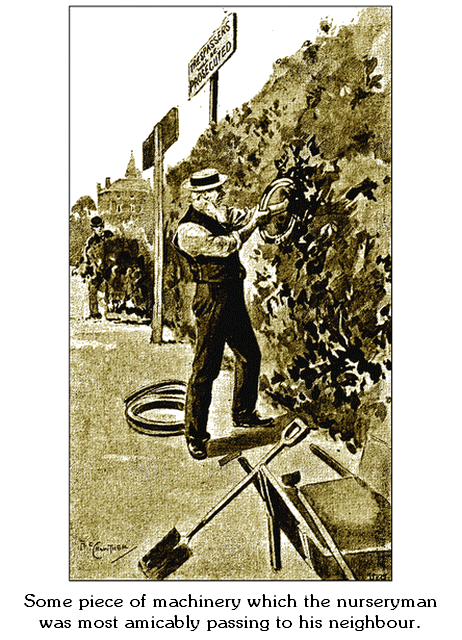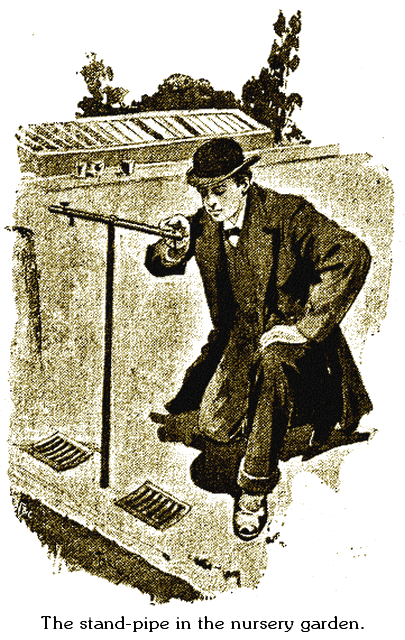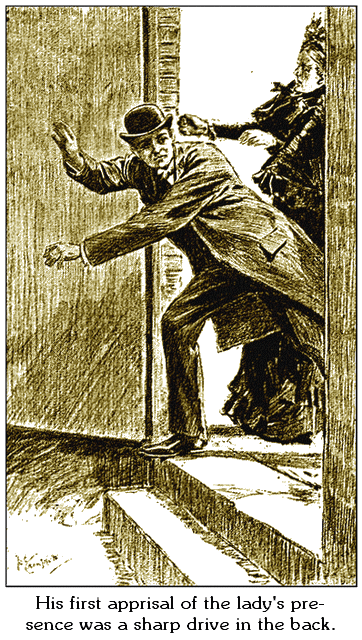Adventures of Martin Hewitt (9 page)
Hewitt smiled and passed on; here plainly was a neighbour’s quarrel of
long standing, for neither board was by any means new. The wall continued,
and keeping by it Hewitt made the entire circuit of the large house and its
grounds, and arrived once more at that part of the wall that enclosed the
nursery garden. Just here, and near the wider gate, the upper part of a
cottage was visible, standing within the wall, and evidently the residence of
the nurseryman. It carried a conspicuous board with the legend, “H. M.
Trennatt, Nurseryman.” The large house and the nursery stood entirely apart
from other houses or enclosures, and it would seem that the nursery ground
had at some time been cut off from the grounds attached to the house.
Hewitt stood for a moment thoughtfully, and then walked back to the outer
gate of the house on the rise. It was a high iron gate, and as Hewitt
perceived, it was bolted at the bottom. Within the garden showed a neglected
and weed-choked appearance, such as one associates with the garden of a house
that has stood long empty.
A little way off a policeman walked. Hewitt accosted him and spoke of the
house. “I was wondering if it might happen to be to let,” he said. “Do you
know?”
“No, sir,” the policeman replied, “it ain’t; though anyone might almost
think it, to look at the garden. That’s a Mr. Fuller as lives there—and
a rum ‘un too.”
“Oh, he’s a rum ‘un, is he? Keeps himself shut up, perhaps?”
“Yes, sir. On’y ‘as one old woman, deaf as a post, for servant, and never
lets nobody into the place. It’s a rare game sometimes with the milkman. The
milkman, he comes and rings that there bell, but the old gal’s so deaf she
never ‘ears it. Then the milkman, he just slips ‘is ‘and through the
gate-rails, lifts the bolt and goes and bangs at the door. Old Fuller runs
out and swears a good ‘un. The old gal comes out and old Fuller swears at
‘er, and she turns round and swears back like anything. She don’t care for
‘im—not a bit. Then when he ain’t ‘avin’ a row with the milkman and the
old gal he goes down the garden and rows with the old nurseryman there down
the ‘ill. He jores the nurseryman from ‘is side o’ the hedge and the
nurseryman he jores back at the top of ‘is voice. I’ve stood out there ten
minutes together and nearly bust myself a-laughin’ at them gray-‘eaded old
fellers a-callin’ each other everythink they can think of; you can ‘ear ‘em
‘alf over the parish. Why, each of ‘em’s ‘ad a board painted, ‘Trespassers
will be Prosecuted,’ and stuck ‘em up facin’ each other, so as to keep up the
row.”
“Very funny, no doubt.”
“Funny? I believe you, sir. Why it’s quite a treat sometimes on a dull
beat like this. Why, what’s that? slowed if I don’t think they’re beginning
again now. Yes, they are. Well, my beat’s the other way.”
There was a sound of angry voices in the direction of the nursery ground,
and Hewitt made toward it. Just where the hedge peeped over the wall the
altercation was plain to hear.
“You’re an old vagabond, and I’ll indict you for a nuisance!”
“You’re an old thief, and you’d like to turn me out of house and home,
wouldn’t you? Indict away, you greedy old scoundrel!”
These and similar endearments, punctuated by growls and snorts, came
distinctly from over the wall, accompanied by a certain scraping, brushing
sound, as though each neighbour were madly attempting to scale the hedge and
personally bang the other.
Hewitt hastened round to the front of the nursery garden and quietly tried
first the wide gate and next the small one. Both were fastened securely. But
in the manner of the milkman at the gate of the house above, Hewitt slipped
his hand between the open slats of the small gate and slid the night-latch
that held it. Within the quarrel ran high as Hewitt stepped quietly into the
garden. He trod on the narrow grass borders of the beds for quietness’ sake,
till presently only a line of shrubs divided him from the clamorous
nurseryman. Stooping and looking through an opening which gave him a back
view, Hewitt observed that the brushing and scraping noise proceeded, not
from angry scramblings, but from the forcing through an inadequate opening in
the hedge of some piece of machinery which the nurseryman was most amicably
passing to his neighbour at the same time as he assailed him with savage
abuse, and received a full return in kind. It appeared to consist of a number
of coils of metal pipe, not unlike those sometimes used in heating apparatus,
and was as yet only a very little way through. Something else, of bright
copper, lay on the garden-bed at the foot of the hedge, but intervening
plants concealed its shape.

Hewitt turned quickly away and made towards the greenhouses, keeping tall
shrubs as much as possible between himself and the cottage, and looking
sharply about him. Here and there about the garden were stand-pipes, each
carrying a tap at its upper end and placed conveniently for irrigation. These
in particular Hewitt scrutinised, and presently, as he neared a large wooden
outhouse close by the large gate, turned his attention to one backed by a
thick shrub. When the thick undergrowth of the shrub was pushed aside a small
stone slab, black and dirty, was disclosed, and this Hewitt lifted,
uncovering a square hole six or eight inches across, from the fore-side of
which the stand-pipe rose.

The row went cheerily on over by the hedge, and neither Trennatt nor his
neighbour saw Hewitt, feeling with his hand, discover two stop-cocks and a
branch pipe in the hole, nor saw him try them both. Hewitt, however, was
satisfied, and saw his case plain. He rose and made his way back toward the
small gate. He was scarce half-way there when the straining of the hedge
ceased, and before he reached it the last insult had been hurled, the quarrel
ceased, and Trennatt approached. Hewitt immediately turned his back to the
gate, and looking about him inquiringly hemmed aloud as though to attract
attention. The nurseryman promptly burst round a corner crying, “Who’s that?
who’s that, eh? What d’ye want, eh?”
“Why,” answered Hewitt in a tone of mild surprise, “is it so uncommon to
have a customer drop in?”
“I’d ha’ sworn that gate was fastened,” the old man said, looking about
him suspiciously.
“That would have been rash; I had no difficulty in opening it. Come, can’t
you sell me a button-hole?”
The old man led the way to a greenhouse, but as he went he growled again,
“I’d ha’ sworn I shut that gate.”
“Perhaps you forgot,” Hewitt suggested. “You have had a little excitement
with your neighbour, haven’t you?”
Trennatt stopped and turned round, darting a keen glance into Hewitt’s
face.
“Yes,” he answered angrily, “I have. He’s an old villain. He’d like to
turn me out of here, after being here all my life-and a lot o’ good the
ground ‘ud be to him if he kep’ it like he keeps his own! And look there!” He
dragged Hewitt toward the “Trespassers” boards. “Goes and sticks up a board
like that looking over my hedge! As though I wanted to go over among his
weeds! So I stuck up another in front of it, and now they can stare each
other out o’ countenance. Buttonhole, you said, sir, eh?”
The old man saw Hewitt off the premises with great care, and the latter,
flower in coat, made straight for the nearest post-office and despatched a
telegram. Then he stood for some little while outside the post-office deep in
thought, and in the end returned to the gate of the house above the
nursery.
With much circumspection he opened the gate and entered the grounds. But
instead of approaching the house he turned immediately to the left, behind
trees and shrubs, making for the side nearest the nursery.
Soon he reached a long, low wooden shed.
The door was only secured by a button, and turning this he gazed into the
dark interior.
Now he had not noticed that close after him a woman had entered the gate,
and that that woman was Mrs. Geldard. She would have made for the house, but
catching sight of Hewitt, followed him swiftly and quietly over the long
grass. Thus it came to pass that his first apprisal of the lady’s presence
was a sharp drive in the back which pitched him down the step to the low
floor of what he had just perceived to be merely a tool-house, after which
the door was shut and buttoned behind him.

“Perhaps you’ll be more careful in future,” game Mrs. Geldard’s angry
voice from without, “how you go making mischief between husband and wife and
poking your nose into people’s affairs. Such fellows as you ought to be well
punished.”
Hewitt laughed softly. Mrs. Geldard had evidently changed her mind. The
door presented no difficulty; a fairly vigorous push dislodged the button
entirely, and he walked back to the outer gate chuckling quietly. In the
distance he heard Mrs. Geldard in shrill altercation with the deaf old woman.
“It’s no good you a-talking,” the old woman was saying. “I can’t hear. Nobody
ain’t allowed in this here place, so you must get out. Out you go now!”
Outside the gate Hewitt met me.
My own adventure had been simple. I had secured a back seat on the roof of
the omnibus whereon Emma Trennatt travelled south from the Bank, from which I
could easily observe where she alighted. When she did so I followed, and
found to my astonishment that her destination was no other than the Geldards’
private house at Camberwell—as I remembered from the address on the
visitor’s slip which Mrs. Geldard had handed in at Hewitt’s office a couple
of days before. She handed a letter to the maid who opened the door, and soon
after, in response to a message by the same maid, entered the house.
Presently the maid reappeared, bonneted, and hurried off, to return in a few
minutes in a cab with another following behind.
Almost immediately Mrs. Geldard emerged in company with Emma Trennatt. She
hurried the girl into one of the cabs, and I heard her repeat loudly twice
the address of Hewitt’s office, once to the girl and once to the cabman. Now
it seemed plain to me that to follow Emma Trennatt farther would be waste of
time, for she was off to Hewitt’s office, where Kerrett would learn her
message. And knowing where a message would find Hewitt sooner than at his
office, I judged it well to tell Mrs. Geldard of the fact. I approached,
therefore, as she was entering the other cab and began to explain when she
cut me short.
“You go and tell your master to attend to his own business as soon as he
pleases, for not a shilling does he get from me. He ought to be ashamed of
himself, sowing dissension between man and wife for the sake of what he can
make out of it, and so ought you.”
I bowed with what grace I might, and retired. The other cab had gone, so I
set forth to find one for myself at the nearest rank. I could think of
nothing better to do than to make for Crouch End Police Station and endeavour
to find Hewitt. Soon after my cab emerged north of the city I became
conscious of another cab whose driver I fancied I recognised, and which kept
ahead all along the route. In fact it was Mrs. Geldard’s cab, and presently
it dawned upon him that we must both be bound for the same place. When it
became quite clear that Crouch End was the destination of the lady I
instructed my driver to disregard the police station and follow the cab in
front. Thus I arrived at Mr. Fuller’s house just behind Mrs. Geldard, and
thus, waiting at the gate, I met Hewitt as he emerged.